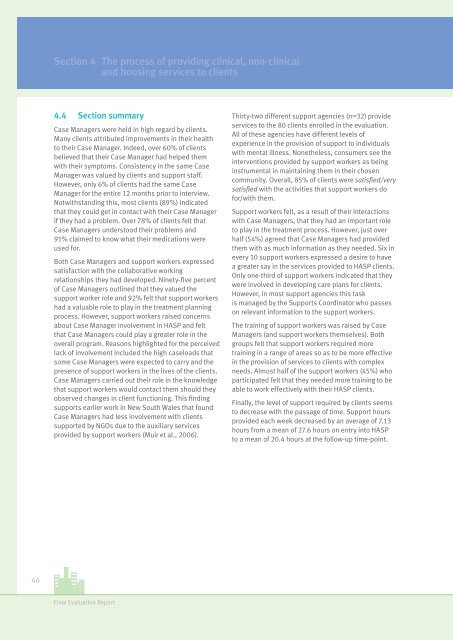Housing and Support Program (HASP): Final Evaluation Report
Housing and Support Program (HASP): Final Evaluation Report
Housing and Support Program (HASP): Final Evaluation Report
Create successful ePaper yourself
Turn your PDF publications into a flip-book with our unique Google optimized e-Paper software.
46<br />
Section 4 The process of providing clinical, non-clinical<br />
<strong>and</strong> housing services to clients<br />
4.4 Section summary<br />
Case Managers were held in high regard by clients.<br />
Many clients attributed improvements in their health<br />
to their Case Manager. Indeed, over 60% of clients<br />
believed that their Case Manager had helped them<br />
with their symptoms. Consistency in the same Case<br />
Manager was valued by clients <strong>and</strong> support staff.<br />
However, only 6% of clients had the same Case<br />
Manager for the entire 12 months prior to interview.<br />
Notwithst<strong>and</strong>ing this, most clients (89%) indicated<br />
that they could get in contact with their Case Manager<br />
if they had a problem. Over 78% of clients felt that<br />
Case Managers understood their problems <strong>and</strong><br />
91% claimed to know what their medications were<br />
used for.<br />
Both Case Managers <strong>and</strong> support workers expressed<br />
satisfaction with the collaborative working<br />
relationships they had developed. Ninety-fi ve percent<br />
of Case Managers outlined that they valued the<br />
support worker role <strong>and</strong> 92% felt that support workers<br />
had a valuable role to play in the treatment planning<br />
process. However, support workers raised concerns<br />
about Case Manager involvement in <strong>HASP</strong> <strong>and</strong> felt<br />
that Case Managers could play a greater role in the<br />
overall program. Reasons highlighted for the perceived<br />
lack of involvement included the high caseloads that<br />
some Case Managers were expected to carry <strong>and</strong> the<br />
presence of support workers in the lives of the clients.<br />
Case Managers carried out their role in the knowledge<br />
that support workers would contact them should they<br />
observed changes in client functioning. This fi nding<br />
supports earlier work in New South Wales that found<br />
Case Managers had less involvement with clients<br />
supported by NGOs due to the auxiliary services<br />
provided by support workers (Muir et al., 2006).<br />
<strong>Final</strong> <strong>Evaluation</strong> <strong>Report</strong><br />
Thirty-two different support agencies (n=32) provide<br />
services to the 80 clients enrolled in the evaluation.<br />
All of these agencies have different levels of<br />
experience in the provision of support to individuals<br />
with mental illness. Nonetheless, consumers see the<br />
interventions provided by support workers as being<br />
instrumental in maintaining them in their chosen<br />
community. Overall, 85% of clients were satisfi ed/very<br />
satisfi ed with the activities that support workers do<br />
for/with them.<br />
<strong>Support</strong> workers felt, as a result of their interactions<br />
with Case Managers, that they had an important role<br />
to play in the treatment process. However, just over<br />
half (54%) agreed that Case Managers had provided<br />
them with as much information as they needed. Six in<br />
every 10 support workers expressed a desire to have<br />
a greater say in the services provided to <strong>HASP</strong> clients.<br />
Only one-third of support workers indicated that they<br />
were involved in developing care plans for clients.<br />
However, in most support agencies this task<br />
is managed by the <strong>Support</strong>s Coordinator who passes<br />
on relevant information to the support workers.<br />
The training of support workers was raised by Case<br />
Managers (<strong>and</strong> support workers themselves). Both<br />
groups felt that support workers required more<br />
training in a range of areas so as to be more effective<br />
in the provision of services to clients with complex<br />
needs. Almost half of the support workers (45%) who<br />
participated felt that they needed more training to be<br />
able to work effectively with their <strong>HASP</strong> clients.<br />
<strong>Final</strong>ly, the level of support required by clients seems<br />
to decrease with the passage of time. <strong>Support</strong> hours<br />
provided each week decreased by an average of 7.13<br />
hours from a mean of 27.6 hours on entry into <strong>HASP</strong><br />
to a mean of 20.4 hours at the follow-up time-point.

















